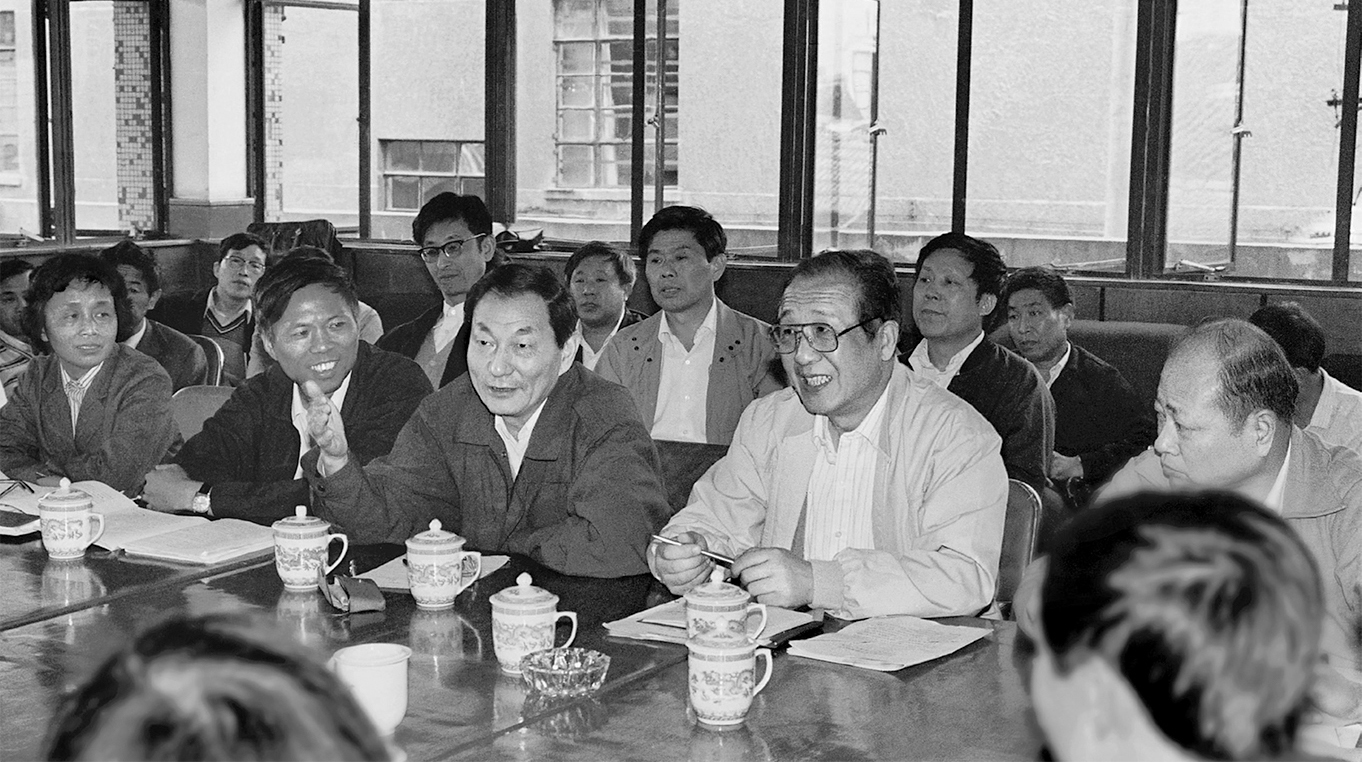TO OVERCOME OUR DIFFICULTIES, WE MUST RELY WHOLEHEARTEDLY ON THE WORKING CLASS1
OCTOBER 26, 1989
This citywide conference on ideological work at industrial enterprises is a good one that has brought together 800 factory directors and Party secretaries from large and medium enterprises to discuss major matters. Some have remarked that it is a key event taking place at a key moment with key people in attendance. It’s had three achievements: first, it aligned our thinking; second, it clarified our direction; third, it stirred up our enthusiasm. It has reached its goal of “first, stability, and second, encouragement.”
Now I’d like to discuss three points.
1. Unity between the Party Secretary and Factory Director
Unity between the Party secretary and the factory director is key to implementing the spirit of the Central Committee’s Document No. 92 and the spirit of this conference. This unity should be based on principles. As [Wu] Bangguo3 said, we can’t have unprincipled “brothers”—they can’t run socialist enterprises properly. We’ve already discovered cases of Party secretaries harboring factory directors, for example, by agreeing to let RMB 300,000 be used to build a house for the factory director. That won’t do! You might seem to be showing concern for his daily life, but the result is to detach him from the people. What we want is unity that is based on principle.
To achieve this sort of unity, the caliber of both parties must be improved. At some factories, the factory director and the Party secretary aren’t very united and the factory isn’t run well. A primary reason is that they themselves are of poor caliber: the director lacks the ability to be factory director, and the secretary lacks the character to be Party secretary. Overall, the standards of the Party secretaries and factory directors at Shanghai’s enterprises are quite high, but this still isn’t enough and we still have to work hard to improve matters, particularly along the following lines.

Participating in and speaking at a conference on political and ideological work at Shanghai’s industrial enterprises, October 25, 1989. Front row: from left, Wu Jintao, Party secretary of the Shanghai No. 1 Cotton Mill, and Chen Xining, factory director of the Shanghai No. 2 Cotton Mill; from the right, Zou Mufa, deputy Party secretary of the Municipal Textile Bureau, and Mei Shouchun, director of the Municipal Textile Bureau. (Photograph by Guo Tianzhong)
Act According to Party Values. We must all proceed from Party values and not get upset over a minor detail or a single word—we should be mutually understanding. The Party secretary should support the factory director. It’s very hard for a factory director to manage people—some may make trouble for no reason, or they may even threaten the personal safety of the director, and it isn’t easy to dare to tackle them or to manage them. Likewise, the factory director must be understanding of the Party secretary and proactively accept the oversight of the Party committee in all matters. You should have more consultations whenever an issue arises, and important matters should be discussed collectively.
It seems that we haven’t talked about Party values in a long time. The essence of building up Party values lies in transforming one’s worldview and one’s view of life. At some units, the factory director and the Party secretary might have been getting along very well but then weren’t able to unite just because each wanted to have the last word over some minor issue—that’s a sign of weak Party values.
Pay Close Attention to Conduct. Conduct is very important. Factory directors and Party secretaries should be closely linked to the people, combine theory with practice, and engage in criticism and self-criticism—that is how they should conduct themselves. If everyone does this, they will unite well and there will be hope for that factory. At present, some colleagues don’t probe deeply into actual situations; they don’t have ties to the people and just keep sitting in the office, establishing “horizontal linkages” or going abroad. They cast the factory aside and leave it alone—they will definitely be unable to run an enterprise in this way.
Raise Your Level of Knowledge. We must study and constantly expand our knowledge. We should study some philosophy so that we aren’t too rigid or one-sided in our approach to issues; we should study some operational management, know how domestic and foreign markets work, and give more thought to the developmental strategies of some enterprises. With such a foundation, we’ll be much more able to speak the same language. I am placing great hopes on you, particularly on those of you who are around 40 to 50 years old. Those who are 50 are our treasure, and those who are 40 are our hope. It wasn’t easy for the Party to nurture you.
Shanghai has advantages in timing, location, and people, and it will develop greatly. You bear the important task of revitalizing Shanghai. Now we’re building an externally oriented economy and need to have “both ends abroad,” yet it’s very hard to find talented people who truly understand international markets and who also know foreign languages, production, and technology. Many people might call themselves top-tier at home but can’t say the same at the international level. Therefore we have to nurture such talent and build up a large team that can “fight its way out” and work for Shanghai all over the world.
How can we organize corporate groups unless we have the right people? Without entrepreneurs who have both vision and managerial talent, we can’t create good corporate groups. We must look beyond our immediate difficulties. Cast your eyes on the whole country, on the Pacific Ocean, and on the whole world. You should recognize the importance of your task and study all the harder. Those of you who are 40 to 50 years old are Shanghai’s pillar, its mainstay. You must treasure your time, study hard, and constantly improve your caliber and your ideological and professional levels.
2. Be Strict with Management
The power to run a factory strictly emanates from the integrity of its cadres. I’ve visited many factories in many countries and noticed that to gain market share, they pay close attention to quality, and their management is always very strict. If Shanghai is to enter international markets and become a truly international city, it must insist on strict and consistent quality management.
This year, everyone is working hard to meet our target of US$5 billion in exports, but what worries me most right now is quality. Although it looks like that figure can still be achieved—and achieve it we must—there might be problems with quality. If so, customers will all return their goods, our brands will be ruined, and next year will be terrible. We must manage and run factories strictly.
How can we go about being strict? To begin with, enterprise leaders must be strict with themselves, that is, we ourselves must be incorruptible. I greatly approve of the old Chinese saying, “Functionaries do not fear my strictness; they fear my integrity. People do not accept my authority because of my ability, but because of my fairness.” It has deep philosophical meaning, and I hope you will all give it careful thought. The theme of this conference includes establishing an atmosphere of integrity at our enterprises. Henceforth, this is the direction we must take; only by doing this will we be able to run factories well.
3. Rely Wholeheartedly on the Working Class
In facing of our current challenges, we must rely wholeheartedly on the working class. Colleagues, even though we’ve already identified quite a few difficulties, the central leadership feels that we are still underestimating their number. That is to say, still greater difficulties lie ahead, and we must be mentally prepared for them. Some are related to external factors—for example, the economic “sanctions” imposed on us by other countries have created many difficulties for us. Others spring from domestic factors—mainly the fiscal and credit “double tightening” measure that we adopted to deal with inflation. Of course it is necessary to tighten the money supply, and this has indeed yielded obvious results. Problems that have accumulated for a decade—namely blind growth and a disjointed [industrial] structure—will inevitably have an adverse impact. Goods won’t sell, capital won’t circulate, enterprises that should be shut down must be shut down, production that should be halted must be halted—these are pains that we must all endure. Provided we wholeheartedly rely on the working class, we will definitely be able to overcome these difficulties.
Colleagues, we don’t have many methods to offer you, but we give you our heart. We give you our heart and tell you about our difficulties. You must energize the workers to think of solutions. If the workers can be mobilized, can understand the big picture, and look to our future, everyone’s spirits will be raised. At the same time, the Municipal Party Committee and the municipal government must strengthen macroeconomic management and help everyone understand some of the macro issues. We need to actively do good ideological work and guide the people into creating an atmosphere of frugal diligence, of doing everything frugally and diligently, so that they are at one with the Party as we overcome our difficulties. As Jiang Zemin says, we want “to invigorate our blood and dissolve clots.”

At the new Shanghai Rail Terminus, sending off national model workers from Shanghai who were traveling to the awards ceremony in Beijing for national model workers and pacesetters, September 26, 1989. On the right, Huang Ju, vice mayor and deputy secretary of the Municipal Party Committee.
There’s no need to be too impatient if some people can’t turn their thinking around. Of course those who sabotage production must be held responsible under the law; for the mischievous troublemakers and lazy gluttons, the emphasis should still be on strengthening education. The key is to have the factory directors and Party secretaries take the lead in creating the conditions for strengthening ideological work in the entire factory. In time, these people will gradually come around. I believe that once our ideological work is done well, there will be great hope for Shanghai.
1. This is the main part of Zhu Rongji’s speech at the closing ceremony of a conference on ideological work at Shanghai’s industrial enterprises.
2. The Central Committee’s Document No. 9 refers to the “Notice of the Central Committee of the Chinese Communist Party on Strengthening Party-Building.” This was discussed and passed at a plenary session of the Politburo on August 28, 1989.